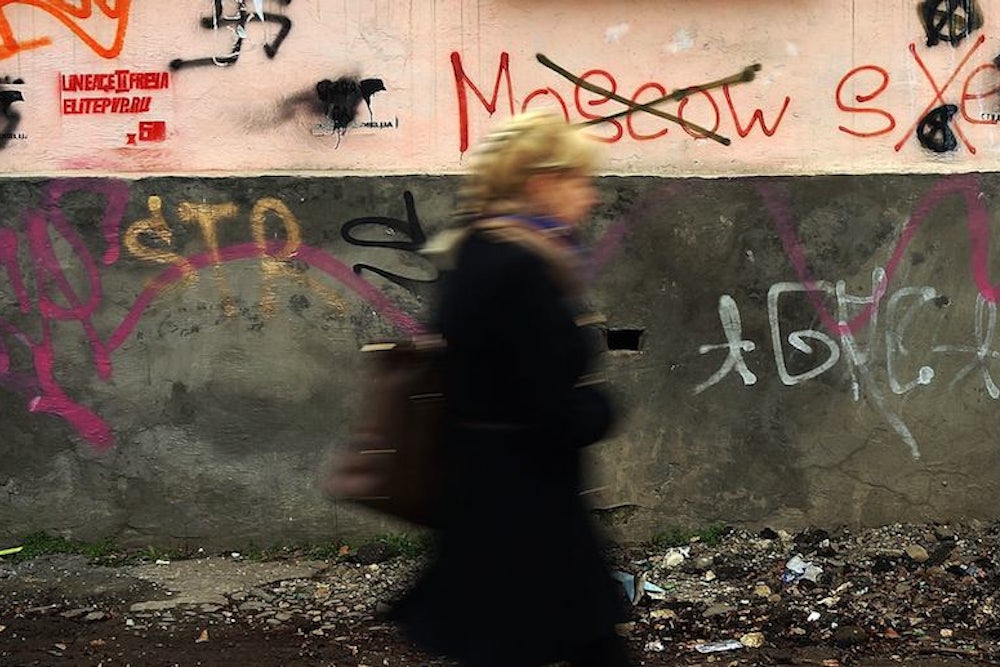SIMFEROPOL, Ukraine — There wasn’t much to see in Lenin Square, Simferopol, on Monday morning. The debris of the Crimean referendum after-party had been swept away. Apart from a penetrating smell—equal parts beer and urine—you would never have known that just a few hours previously a delirious crowd had danced around the statue of the Bolshevik leader, hailing the peninsula’s unification with Russia.
And the crowd really was delirious. Chants of “Ross-i-ya, Ross-i-ya” swept through the square before dying away beneath the weight of the rock music blaring from the stage. A laser display cast huge green words onto nearby buildings: “We are in Russia”; “I, you, we, Crimea, Russia”; “Crimean spring.” The last one was no doubt intended to summon up the spirit of Tahrir, but I found myself thinking “Springtime for Putin.”
Sergey Aksyonov, the pro-Russian politician who is now the region’s unchallenged leader (and target of U.S. sanctions), came out to receive the adulation. He stood with his arms away from his sides, soaking up the applause like a penguin in a shiny suit. “Good evening, Crimea,” he shouted, to prolonged and stormy applause. “We have done it, we have triumphed (more cheers). We Crimeans, with the whole world against us, have moved to Russia.”
Gennady Luchina, a man standing next to me with a moustache and leather cap, was blinking back tears as the crowd roared the Russian national anthem.
“I have never been happier than I am now,” he told me.
Judging by the deserted streets Monday morning, most of the celebrants slept off their hangovers. But there was no rest for Aksyonov. He and the Crimean parliament zipped through a series of laws which he publicized on Twitter throughout the day. Crimea will join Russia. Crimea will move to Moscow time. The budget will be doubled thanks to Russian money. Then he flew to Moscow, pausing only to tweet jokes about the sanctions that Washington and Brussels had just imposed on Russian and Crimean officials.
I went to a café with Tatyana Skorik, a handsome blonde Ukrainian woman whose hands shook throughout our conversation, a bracelet in the Ukrainian colors of blue and yellow trembling on her wrist. She had not gone to the square to see the Russians’ celebration, or even watched it on television. “I could not watch this, it would be like watching lunatics celebrate. The Soviet Union used to put sane people in mental hospitals, and that’s what I feel like, as if I am a sane person who’s been put in a mental hospital,” she said.
Skorik asked how Crimea could move from one country to another in just a few weeks. Where would it get gas, power and water—all of which come from mainland Ukraine? What would happen to the rights they had got used to? Would they have to adopt Russian laws, such as one that mandates prison for anyone supporting separatism? “We Christians believe we have three mothers: our mother, our motherland, and the Virgin Mary. I lost my mother to cancer a year ago, and now this cancer is killing my motherland. All I have left is the Virgin Mary,” she said.
Most banks in Simferopol were closed for the day, but a branch of Russia’s Sberbank was open, and a regular stream of customers approached its cashiers to ask what would happen to their money. The cashiers, though they had no more idea than anyone else, tried to re-assure them. “The money will not be lost, it will be accessible, though I don’t know myself what will happen. Don’t worry, though, everything will be fine, everything will be accessible,” a dark-haired cashier reassured a middle-aged couple. “The banks will work but we do not know in what currency at the moment.”
I tried to locate a Finance Ministry spokesman to find out for myself, but was shooed out of the door by a policeman who told me that they did not have a press service and were closed for the day. This was before Aksyonov tweeted that Crimea would adopt the Russian rouble in April, and that all property belonging to Ukraine on Crimea territory now belonged to his government.
One such property is the military base on a hill above the town of Bakhchisarai, a half-hour’s drive from Simferopol. The front gate was decorated with the flags of Crimea and Russia—both of them red, white, and blue tricolors, but with the horizontal stripes in a different order.
Lieutenant Colonel Sergei Gunder, the Ukrainian army officer in charge of the base, came out to explain his difficulty. “We had an ultimatum that, if we refused to pass into the service of the Russian Federation, we must leave the territory of the base. They gave us one hour but that finished long ago,” he told me. Not all of his soldiers had been so loyal to the government in Kiev. Some 60 had changed sides, he said, while just 50 had stayed with him. “The Russians asked me and my soldiers to move into their service, and to receive citizenship within seven days, but I turned them down,” he said, before turning round and going back through the gate.
He had not been able to deny all their demands, however. I walked along the fence to see if I could peek into the base, eventually finding a vantage point. Among the barracks were two green military trucks guarded by men in unmarked uniforms. They tried to stand in front of the front truck’s number plate to stop me from recording it, but were not quick enough. It was the distinctive black of the Russian military, and its number (0199 HM 90 RUS) clearly identified it as belonging to the Russian Black Sea fleet. That base is a lot like Crimea itself on Monday: half of it defiantly Ukrainian, half of it triumphantly Russian, and none of it making much sense.
